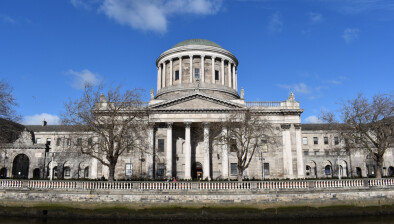Planning bill to shift away from ‘no foal no fee’

Eamon Ryan
Landmark new planning legislation will improve access to justice by “switching away from a ‘no foal no fee’ basis to one where we are going to cover the costs, win or lose”, transport minister Eamon Ryan has claimed.
Ministers yesterday approved the Planning and Development Bill 2023, which the Department of Housing, Local Government and Heritage describes as the third-largest bill in the history of the State.
It follows a 15-month review of the planning system and aims, among other things, to respond to concerns that frivolous legal challenges are causing needless delays to much-needed housing and energy projects.
In remarks at a government press conference which he shared on his Twitter page, Mr Ryan said provisions reforming the judicial review process and introducing a new means-tested environmental legal cost scheme will “make sure we really do give people access to justice”.
When seeking to initiate a judicial review, an applicant will be able to apply to the environmental legal costs scheme for a legal aid contribution in respect of the case.
If the applicant wins, it will be able to recover its cost in line with the scale of fees. If an eligible applicant does not win its case, it may receive a contribution from the scheme, based on a means assessment and the applicant’s circumstances, up to 100 per cent of the applicable scale fees.
The bill includes a number of other reforms to the judicial review process, including the removal of the leave stage and restrictions on who can initiate judicial reviews.
Unincorporated organisations such as residents’ associations will be able to take judicial review cases only if they have a constitution and two-thirds of their members vote in favour of taking a judicial review. The names and addresses of those who voted for the judicial review will have to be filed with the application.
The bill, which represents the largest reshaping of the planning system in Ireland for more than two decades, will be published “in the coming weeks”.
It will introduce mandatory, statutory timelines across all consenting processes, including, for the first time for An Bord Pleanála — which will be renamed An Coimisiún Pleanála and reformed to separate its corporate, decision-making and governance functions.
Policies and guidance will be more consistent throughout all tiers of planning, from national to local. Ministerial guidelines and policy directives will be upgraded to national planning statements, approved by government.
The lifespan of development plans will be extended from six years to 10 years, with a review after year five, and will be more strategic in nature. The cycles of these plans will align to the cycle of census data availability and will be reviewed by local elected members every five years.
Taoiseach Leo Varadkar said: “We need faster planning decisions, more timely judicial reviews and fewer of them. It’s currently taking far too long for applications to get through the system and it’s in all our interests to make sure the planning system is resourced properly.
“The Planning and Development Bill will bring more certainty and consistency to the planning process, and also make it more coherent and user-friendly. We have much to do — from housing, to renewable energy, to regional development — and this legislation will be a real step change. So let’s get it done.
Tánaiste Micheál Martin said: “Housing is the single most urgent and important social issue facing our country at this time. This bill, the third largest ever to come before the Oireachtas, will bring about fundamental improvements to our planning laws, meaning we can get on with the job of delivering Housing for All’s objectives and our other major infrastructure plans.”
Housing minster Darragh O’Brien said: “The reforms in this bill will facilitate increased housing supply and critical infrastructure.
“It is vital we embed structural changes to our planning system to help tackle the many challenges we have and this bill represents a major step in achieving this, along with related reforms such as the roll out of e-planning and a programme of resource review to underpin the many reforms contained in the legislation.”







